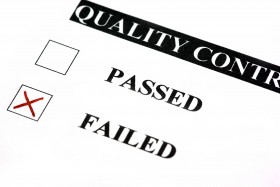What is Strict Liability in Product Injury Cases?

In defective product injury cases, strict liability is a rule that says the manufacturer, distributor, or seller of a product can be held liable for injuries caused by a defective product, even if they weren’t behaving negligently. The strict liability rule was introduced as a way to make it easier for injured parties to win cases and collect damages for their injuries.
Although the manufacturer is the most common defendant in product injury cases, strict liability includes distributors and sellers as well to ensure that injured people aren’t left with no recourse simply because they weren’t able to pin-point exactly who was directly responsible for a defective product.
Before strict liability became widely used in the 1960s, injuries caused by defective products were covered by standard negligence rules. This meant plaintiffs had to prove the manufacturer behaved negligently or in a way that would be considered careless when compared to generally accepted standards used by other people in the industry. Because of this, it was extremely difficult, if not impossible or prohibitively expensive, for injured people to prove the manufacturer did anything negligent. If the negligent act just happened to be something that was generally accepted all throughout the industry, it couldn’t possibly be argued the manufacturer failed to meet basic industry standards of care.
It’s important to note that even under strict liability, manufacturers are not automatically liable for injuries caused by a product. The injured person still has to prove the product was sold in a way that was excessively dangerous, that the injury was caused by the product, and that the product was meant to reach consumers without changes being made to the product.
The manufacturer, distributor, or seller of a product wouldn’t be held liable for injuries caused by a product if a person was using the product in a way that was unsafe, despite being aware of the risks of doing so. For example, a hair dryer manufacturer wouldn’t be held responsible if a person is injured while using a hair dryer near water, even though the hair dryer came with multiple warnings about keeping it away from water. Manufacturers also aren’t responsible if a person is injured while using a product they know to is defective.
To have a successful product injury case, the product needs to have been used in the way it was intended to be used. Manufacturers can’t be held responsible if a person uses a product in a way they couldn’t reasonably expect it to be used. They also can’t be held liable if there is some other event that interfered with the product being used. For example, let’s say a person is carrying a pot of boiling water, then trips and falls, causing them to be severely burned. In that situation, the injury was not caused by some flaw in the pot, it was primarily caused by the person tripping and falling.
Our personal injury lawyers at the Law Offices of Goodwin & Scieszka are able to handle other negligent accident cases like slip and fall accident claims. Contact us to see how we can help you receive fair compensation.






